Mazda MX-30 vs Tesla Model 3 - Differences and prices compared
Costs and Efficiency:
Looking at overall running costs, both models reveal some interesting differences in everyday economy.
Mazda MX-30 has a a bit advantage in terms of price – it starts at 30800 £, while the Tesla Model 3 costs 34300 £. That’s a price difference of around 3429 £.
In terms of energy consumption, the advantage goes to the Tesla Model 3: with 13.20 kWh per 100 km, it’s distinct more efficient than the Mazda MX-30 with 18.30 kWh. That’s a difference of about 5.10 kWh.
As for range, the Tesla Model 3 performs clearly better – achieving up to 750 km, about 665 km more than the Mazda MX-30.
Engine and Performance:
Under the bonnet, it becomes clear which model is tuned for sportiness and which one takes the lead when you hit the accelerator.
When it comes to engine power, the Tesla Model 3 has a clearly edge – offering 460 HP compared to 170 HP. That’s roughly 290 HP more horsepower.
In acceleration from 0 to 100 km/h, the Tesla Model 3 is convincingly quicker – completing the sprint in 3.10 s, while the Mazda MX-30 takes 9.10 s. That’s about 6 s faster.
In terms of top speed, the Tesla Model 3 performs significantly better – reaching 262 km/h, while the Mazda MX-30 tops out at 140 km/h. The difference is around 122 km/h.
Space and Everyday Use:
Cabin size, boot volume and payload all play a role in everyday practicality. Here, comfort and flexibility make the difference.
Seats: offers more seating capacity – vs .
In curb weight, Tesla Model 3 is slight lighter – 1822 kg compared to 1849 kg. The difference is around 27 kg.
In terms of boot space, the Tesla Model 3 offers clearly more room – 594 L compared to 350 L. That’s a difference of about 244 L.
When it comes to payload, Mazda MX-30 a bit takes the win – 402 kg compared to 333 kg. That’s a difference of about 69 kg.
Who comes out on top?
Overall, the Tesla Model 3 shows itself to be dominates this comparison and secures the title of DriveDuel Champion.
It convinces with the more balanced overall package and proves to be the more versatile choice for everyday use.
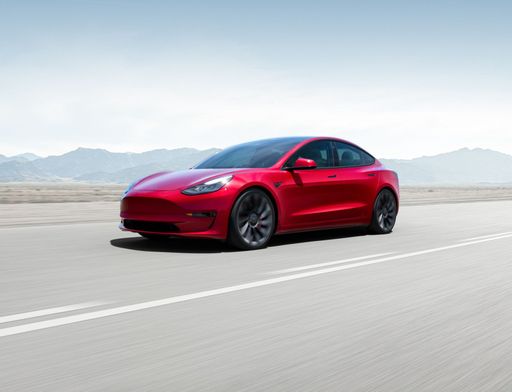 @ Tesla, Inc.
@ Tesla, Inc.
Tesla Model 3
Costs and Consumption
View detailed analysis
Engine and Performance
View detailed analysis
Dimensions and Body
View detailed analysis
Mazda MX-30
The Mazda MX-30 trades conventional EV practicality for a boutique vibe, wrapping easy urban agility and a stylish, artisan interior into a compact package that stands out in the crossover crowd. It’s ideal for city-minded buyers who value design and driving feel over long-distance trips, and its quirky details prove Mazda can be playful without losing its driver-focused soul.
details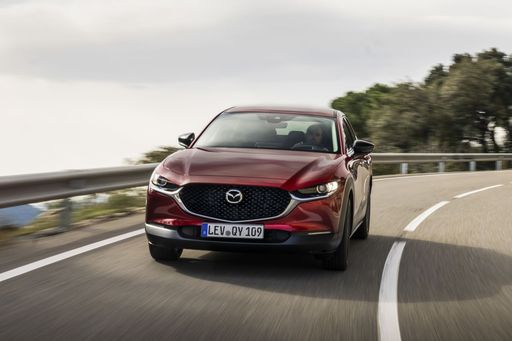 @ Mazda Motor Corporation
@ Mazda Motor Corporation
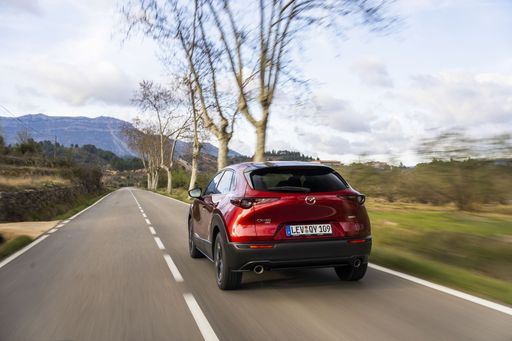 @ Mazda Motor Corporation
@ Mazda Motor Corporation
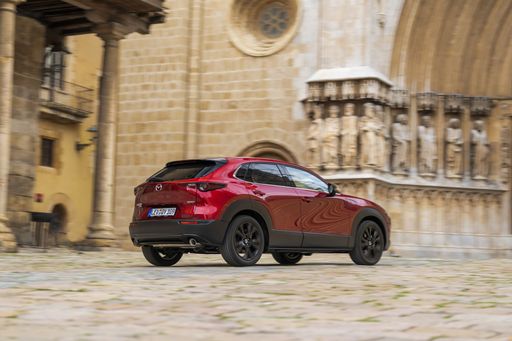 @ Mazda Motor Corporation
@ Mazda Motor Corporation
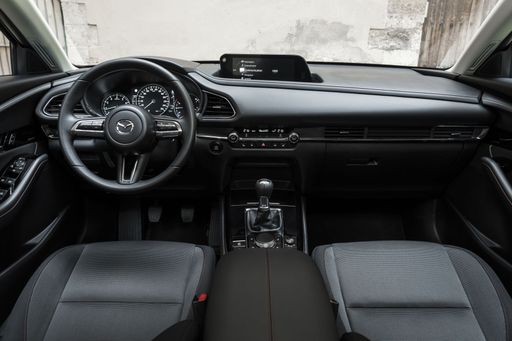 @ Mazda Motor Corporation
@ Mazda Motor Corporation
Tesla Model 3
The Tesla Model 3 slices through daily commuting with a silent, confident shove that makes petrolheads reassess their life choices, while its minimalist cabin feels more like a slick gadget gallery than a traditional car interior. For buyers after a fuss-free, tech-forward electric with plenty of grin factor and low running drama, it’s hard to beat—just don't be surprised when the car updates itself overnight.
details @ Tesla, Inc.
@ Tesla, Inc.
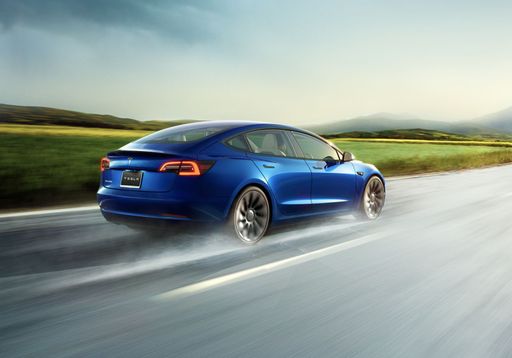 @ Tesla, Inc.
@ Tesla, Inc.
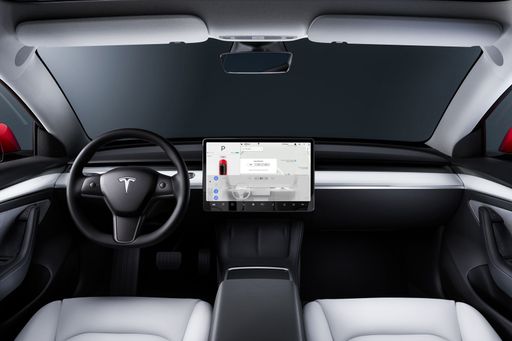 @ Tesla, Inc.
@ Tesla, Inc.
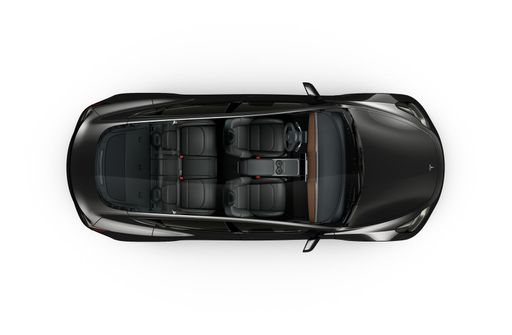 @ Tesla, Inc.
@ Tesla, Inc.
 @ Mazda Motor Corporation
@ Mazda Motor Corporation
|
 @ Tesla, Inc.
@ Tesla, Inc.
|
|
|
|
Costs and Consumption |
|
|---|---|
|
Price
30800 - 37100 £
|
Price
34300 - 50100 £
|
|
Consumption L/100km
-
|
Consumption L/100km
-
|
|
Consumption kWh/100km
18.30 kWh
|
Consumption kWh/100km
13.2 - 16.7 kWh
|
|
Electric Range
85 km
|
Electric Range
550 - 750 km
|
|
Battery Capacity
-
|
Battery Capacity
64.5 - 83 kWh
|
|
co2
22 g/km
|
co2
0 g/km
|
|
Fuel tank capacity
-
|
Fuel tank capacity
-
|
Dimensions and Body |
|
|---|---|
|
Body Type
SUV
|
Body Type
Sedan
|
|
Seats
5
|
Seats
5
|
|
Doors
5
|
Doors
4
|
|
Curb weight
1849 kg
|
Curb weight
1822 - 1929 kg
|
|
Trunk capacity
332 - 350 L
|
Trunk capacity
594 L
|
|
Length
4395 mm
|
Length
4720 - 4724 mm
|
|
Width
1848 mm
|
Width
1850 mm
|
|
Height
1555 mm
|
Height
1431 - 1440 mm
|
|
Max trunk capacity
1137 - 1155 L
|
Max trunk capacity
-
|
|
Payload
402 kg
|
Payload
303 - 333 kg
|
Engine and Performance |
|
|---|---|
|
Engine Type
Plugin Hybrid
|
Engine Type
Electric
|
|
Transmission
Automatic
|
Transmission
Automatic
|
|
Transmission Detail
Reduction Gearbox
|
Transmission Detail
Reduction Gearbox
|
|
Drive Type
Front-Wheel Drive
|
Drive Type
Rear-Wheel Drive, All-Wheel Drive
|
|
Power HP
170 HP
|
Power HP
283 - 460 HP
|
|
Acceleration 0-100km/h
9.10 s
|
Acceleration 0-100km/h
3.1 - 6.1 s
|
|
Max Speed
140 km/h
|
Max Speed
201 - 262 km/h
|
|
Torque
-
|
Torque
420 - 660 Nm
|
|
Number of Cylinders
-
|
Number of Cylinders
-
|
|
Power kW
125 kW
|
Power kW
208 - 338 kW
|
|
Engine capacity
830 cm3
|
Engine capacity
-
|
General |
|
|---|---|
|
Model Year
2025
|
Model Year
2025
|
|
CO2 Efficiency Class
B
|
CO2 Efficiency Class
A
|
|
Brand
Mazda
|
Brand
Tesla
|
What drivetrain options does the Mazda MX-30 have?
Available configurations include Front-Wheel Drive.
The prices and data displayed are estimates based on German list prices and may vary by country. This information is not legally binding.
